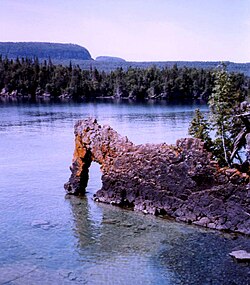Hemlo, Ontario
| Unorganized Thunder Bay | |
|---|---|
| Unorganized area | |
| Thunder Bay, Unorganized | |

Sleeping Giant Provincial Park
|
|
| Coordinates: 50°00′N 88°00′W / 50.000°N 88.000°WCoordinates: 50°00′N 88°00′W / 50.000°N 88.000°W | |
| Country |
|
| Province |
|
| District | Thunder Bay |
| Government | |
| • Federal riding |
Algoma—Manitoulin—Kapuskasing Kenora Thunder Bay—Rainy River Thunder Bay—Superior North |
| • Prov. riding |
Algoma—Manitoulin Kenora—Rainy River Thunder Bay—Atikokan Thunder Bay—Superior North |
| Area | |
| • Land | 97,007.34 km2 (37,454.74 sq mi) |
| Population (2011) | |
| • Total | 5,909 |
| • Density | 0.1/km2 (0.3/sq mi) |
| Time zone | EST (UTC-5) |
| • Summer (DST) | EDT (UTC-4) |
| Postal Code FSA | P0T |
| Area code(s) | 807 |
Unorganized Thunder Bay District is an unorganized area in northwestern Ontario, Canada in Thunder Bay District. It comprises all parts of the district that are not part of an incorporated municipality or a First Nations reserve.
Most of the territory is within the Eastern Time Zone, but the part west of the 90th meridian is in the Central Time Zone.
Population trend:
Provincial parks in Unorganized Thunder Bay include:
It is also home to one National Park of Canada: Pukaskwa National Park.
Gold was noted in the area since 1869, but it wasn't until Peter Moses from Heron Bay, discovered additional gold that prospectors flocked to the area. In 1947, Dr. J. Williams and Moses staked 11 claims, which became the Lake Superior Mining Corporation. However, not much development took place until 1979, when Don and David McKinnon, along with John Larche, staked claims in Hemlo and the Manitouwadge area. The Williams Mine started operation in 1985, and produced 445,320 ounces of gold from a 2.45 meter wide ore body. The Golden Giant Mine produced 446,858 ounces in 1994 from a quartz sericite schist host rock. The David Bell Mines produced 204,251 ounces in 1994. The Hemlo gold mines had produced more than 6,000,000 ounces of gold by 1992.
...
Wikipedia

